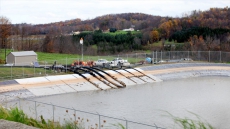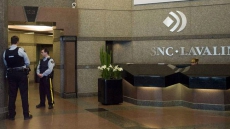OTTAWA — A one-time $2.2-billion windfall in the federal budget to help Canadian cities improve roads, bridges, highways and water systems won't become an annual tradition, Finance Minister Bill Morneau warned Wednesday, even in the face of what he acknowledged were problems getting the original projects off the ground.
Tuesday's multibillion-dollar top-up will double the money cities receive through the federal gas-tax fund, which sends money directly to municipalities each year.
The spending blueprint says the Liberals have approved more than 33,000 projects worth about $19.9 billion in federal financing under new and existing infrastructure programs, but also acknowledges spending has been slower than anticipated, including "some jurisdictions being slower to prioritize projects."
Morneau called out four provinces on Tuesday in explaining the Liberals' decision to use the gas-tax fund to kickstart more projects, naming Ontario, Saskatchewan, Manitoba, New Brunswick — provinces with conservative-minded governments that don't always co-operate readily with the federal Liberals.
Topping up the fund was the appropriate response, Morneau said Wednesday at a post-budget event in Toronto.
"We haven't been able to do exactly what we expected and that was the reason for the municipal infrastructure top-up," he said.
"What you shouldn't do is take this as a conclusion on how we will go forward, but what it is, is an important way for us to move forward now in getting some projects that are stalled going."
Federal infrastructure funding is regularly subject to delays because funds only flow once receipts are filed, which causes a lag between when work occurs and money is paid out.
An internal analysis of the Liberal program pointed to several issues to explain the pace of spending: too many low-value projects requiring the same detailed review as those much larger in size and delays in getting provincial and territorial project recommendations.
Elections in Ontario and New Brunswick last year paused provincial project approvals during the campaign. There are also delays in approvals when a new government is elected — as was the case in Ontario and New Brunswick — as new office holders learn their files and review government operations.
Even more spending will flow through funds managed by the Federation of Canadian Municipalities. The federation's president, Mayor Vicki-May Hamm of Magog, Que., said the measures are a direct response to pleas from cities to modernize their relationship with Ottawa so they don't have to rely solely on the provinces.
Under the federal Liberal government's infrastructure program, federal spending will top $186 billion over the next decade.
How successful the plan has been to date is an area of contention between the Liberals and the parliamentary budget watchdog, who most recently questioned anew whether increases in federal spending have created the jobs promised by the government.
Other investments have, according to provinces, fallen short of what was required, particularly on rural broadband internet service. Provinces had asked the Liberals to find a way for the Canada Infrastructure Bank to finance work, and pressed for better co-ordination in spending to connect remote or rural communities.
The Liberals created the bank in 2017 to take $35 billion in federal financing and use it to leverage three to four times that from the private sector to help pay for major highways, bridges, and water and electrical systems. To get private money involved, projects needed to produce revenue streams — tolls, for instance. Fees for internet service are already typical, but serving remote, sparsely populated areas with high-speed lines is a financial challenge.
On Tuesday, the Liberals added a new component to the Crown agency, earmarking $1 billion over 10 years for rural broadband, but mandating the bank find at least $2 billion more in private capital for the initiative. It was part of a plan to deliver up to $6 billion over a decade to connect everyone in the country to high-speed internet by 2030.
Quick reactions to the 2019 federal budget:
The opposition would like to see us make cuts very rapidly — their idea is balance the budget at any cost. Well, if we had taken that approach in 2015 we would not be where we are today with a better outcome for middle-class Canadians. We'd be in a more difficult spot. — Finance Minister Bill Morneau, explaining the decision to spend all the government's unexpectedly higher revenues and continue running a deficit
With Budget 2019, Justin Trudeau is covering up his corruption under $41 billion of brand-new spending paid for by tax hikes if he's re-elected. It is the most expensive coverup in the history of coverups. Mr. Trudeau's plan is obvious. Massive deficits to distract Canadians from his corruption before the election. Massive tax hikes to pay for them after the election. —Conservative Leader Andrew Scheer
Canadians were counting on this Liberal government to meet their basic needs, and sadly, they were let down. We will have the courage to make different choices. — NDP Leader Jagmeet Singh
If we are going to have true reconciliation in Canada, we have to close the gap. We have to maintain the momentum for that. — Perry Bellegarde, national chief of the Assembly of First Nations, approving of plans to add $4.5 billion in spending on Indigenous services
The federal government recognizes the impact of trade agreements on our sector and is following through on its commitment to support our domestic dairy industry. — Pierre Lampron, president of the Dairy Farmers of Canada, on $3.9 billion in compensation for farmers affected by new free-trade deals
That's a safer way to try and deliver support for a younger demographic … without disproportionately accelerating demand in a way that just encourages people to borrow more, that drives up demand and then that drives up the overall purchase price. — Paul Kershaw of Generation Squeeze, on the plan to have the Canada Mortgage and Housing Corp. share down-payment costs with first-time homebuyers
We think there are a lot of design issues with that and we would much rather see a training credit focused on the needs of the working world rather than what an employee may wish to study. — Dan Kelly of the Canadian Federation of Independent Business, on plans to have the employment-insurance system support workers while they take time off to train in new skills
The proposed rules could lead to no Canadian-headquartered large technology companies, which would have a negative impact on our prosperity and competitiveness for decades to come ... Our members are anxious to ensure these changes do not hinder a high-growth company's ability to access and retain skilled talent and Canada's long-term economic prosperity. — Ben Bergen of the Council of Canadian Innovators, on Liberal plans to limit the favourable tax treatment of stock options in executive pay packages
Capping the stock-option deduction is a welcome surprise in this budget to partially close one of the most regressive tax loopholes. However, it should be the start, and not the end, of addressing and capping regressive tax expenditures. — David Macdonald, senior economist at the Canadian Centre for Policy Alternatives



